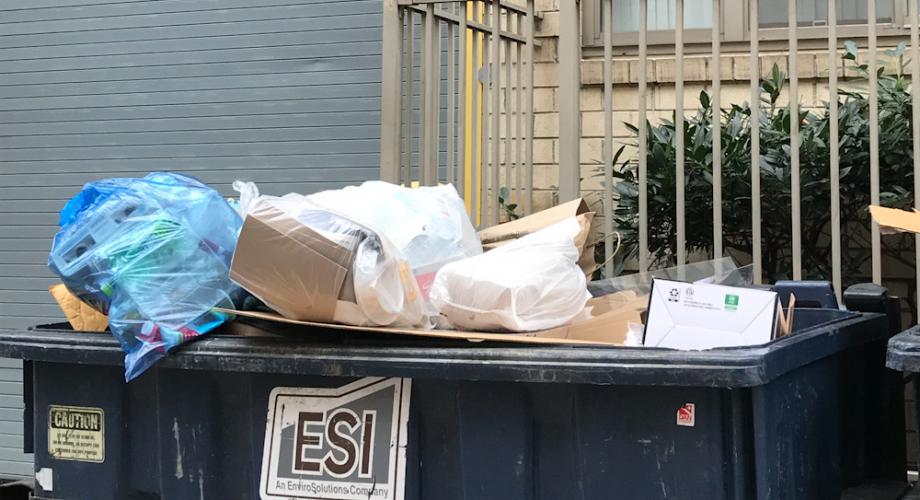Waste-hauling costs are increasing and recycling policies are becoming stricter. Apartment operators are seeing the effects and are taking a variety of steps to improve efficiency and cost-effectiveness. In Part 2 of this 13-part, in-depth report, we explore contract negotiation strategy for waste hauling.
When bidding for waste hauling services, apples-to-apples is hard to come by.
Bozzuto’s Peter Zadoretzky says when his company negotiates contracts, it tries to consolidate the pricing and keep it at a fixed-rate because fees can change and drive up monthly costs.
Bell Partners’ Ashley Cook says this is easier said than done.
“We’ve been working through the RFP process for the past four months,” Cook says. “Our goal is to keep costs flat. This stage is so important, because whatever company we go with, it will set the course for us for the next three to five years.”
Creating an RFP with apples-to-apples numbers for the competing companies to compare across the board is a challenge for any procurement officer. Pricing is unique to each community. The final price involves many factors: The number of pickups needed, the size of the container, the type of waste that is in the container and the distance the truck has to go to pick up the trash, Cook says.
“Different haulers account for and charge differently for things such as tonnage fees or hauling fees,” he says. “The haulers do this intentionally. Haulers are not going to offer an apartment community a flat rate. It’s not in their best interest. And with so many factors that go into pricing, comparing RFPs is inconsistent.”
The best way to guarantee a waste-hauling contract renewal from Camden, Pippin says, is for the service provider to not contact Pippin after the agreement is signed.
“I don’t want to hear from them,” Pippin says. “No complaints about us. If I never hear from them during the 36 months, we renew. If problems come up, they can figure out how to take care of it. That’s their business. Don’t tell me their machines are clogged.”
LumaCorp says its top priority when negotiating a new waste hauling contract is flexibility with the service level because community waste disposal needs evolve.
“For example, in the early days of the e-commerce boom, packaging was a lot less efficient than it is today,” Ian Mattingly says. “We had to add collection days and containers in many locations in order to handle these items. We did. And now we have been able to reverse this trend at many of our communities.”
Length of term is the No. 2 priority, Mattingly says. “To allow our owners the maximum of flexibility in asset management, we do not like to tie them to long-term contracts that may ultimately need to be assumed by a successor entity or owner. Price, of course, is a key consideration in these negotiations, though we have found fairly tight spreads in pricing of late.”
Alpha Barnes’ Cathy Johnson says gone are the days when an operator could sign with a waste hauler and then not have to think about them unless there is a problem.
“We have found billing issues lately and we have started to push back,” she says. “Now, we are staying on top of things. Our company used to treat waste management invoicing like it was a utility. Rates were set. Invoices were sent to the corporate office, which then paid them. But if you don’t have the property staff reviewing the invoice, the corporate office can’t be sure of the details and situations. The onsite staff can point out the errors. You can complain to the hauler, but you can’t just not pay the bill. If you do that, they cut off service. Appealing is a time-consuming process.”
Having cap limits on fees is critical, JVM’s Kevin Villont says.
“This ensures that any increases that will be allowed through the term are controlled,” he says. “Establishing limits for ancillary fees (i.e., fuel, environmental, recycling recovery fees) and contracting additional service charges such as extra pick-ups and service change rates all play into a successful rate-protected agreement.”
Jana Alfiero, Waste Solutions Specialist, Cortland, says billing errors are inevitable.
“Check your contract; are charges consistent each month?” she says. “When renewal time comes around, they will sneak in increases. Make sure your contract has a cap on rate increases. Make sure you see how and what they define as a “trip charge.” Haulers also will push you to sign a five-year contract. Make sure the length of the term is something you can live with.”
Sometimes signing a long-term contract pays off. Arlington, Mass., signed a 10-year contract in 2012 when the recycling markets were economically healthier.
“When we signed it, I heard criticism from recycling professionals in our region,” says Charlotte Milan, Recycling Coordinator for Arlington. “We didn’t benefit from some revenue opportunities available when recycling materials had greater value years ago, but we aren’t suffering from rising costs now. Currently, the overall recycling market is in a tough place, but our costs are locked in for a couple more years. It’s cyclical, and we’ll continue to watch it. When our contract comes up, we’ll weigh options.”
Back to the Trash Talking in-depth report or read the part 3 story: Trash-Collection Franchise Markets Hold Apt Companies Hostage.
